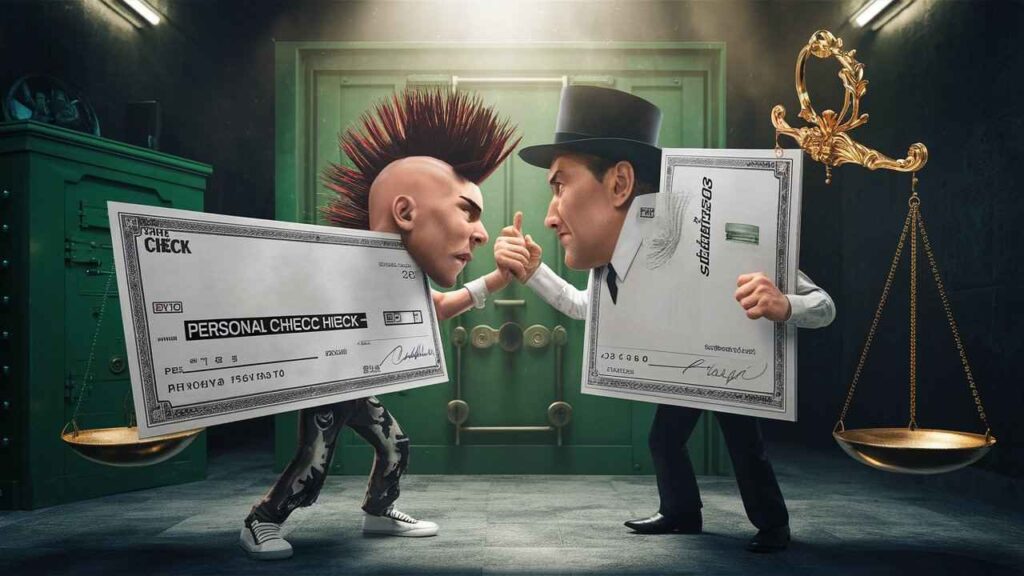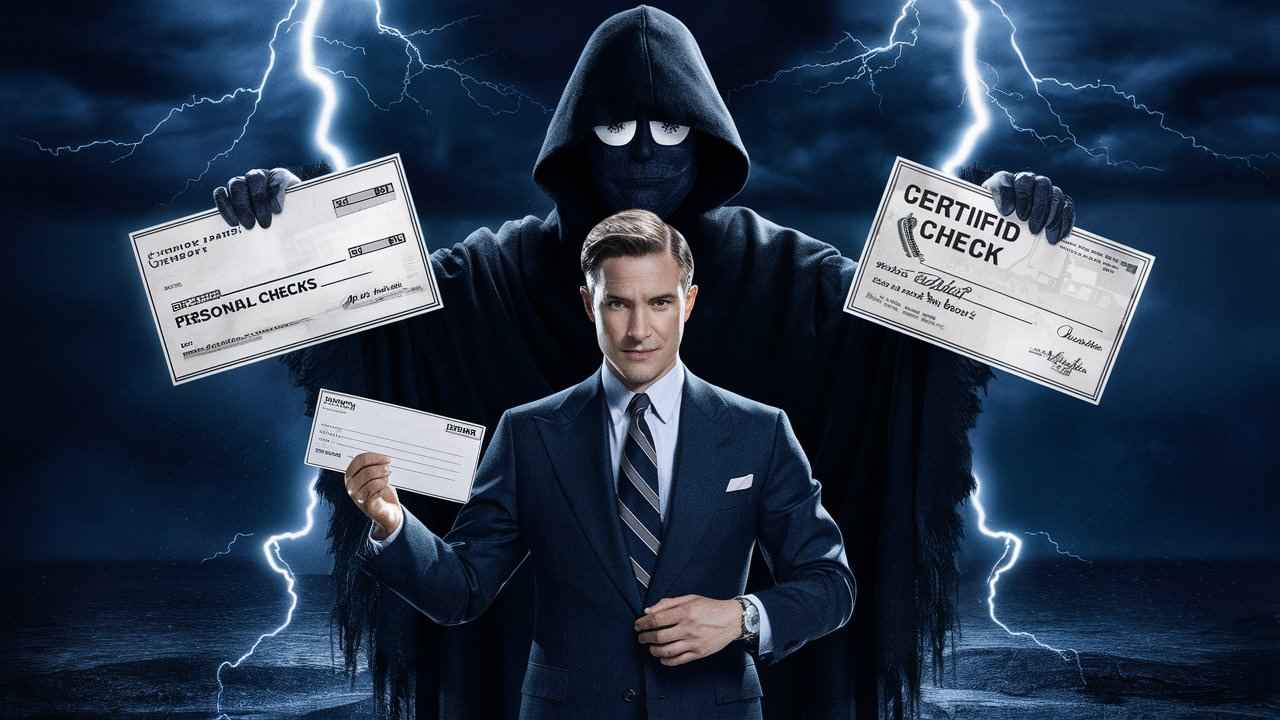The Great Check Showdown
Setting the Stage: Why Checks Still Matter in a Digital Age
In a world teeming with technological wonders💷think about smartphones that practically do your laundry💷checks might seem like relics from the Stone Age. Yet, they persist! Why? Because sometimes, digital just won’t cut it. You might be trying to make a hefty down payment on a house or perhaps you’re just tired of sharing your banking secrets with the entire Internet. The good ol’ Personal Check and the ever-reliable Certified Check come to the rescue!

The Unlikely Heroes of Payment Methods: Personal vs. Certified Checks
Welcome to the showdown! The Personal Check, your friendly neighborhood payment method, is often used for everything from pizza deliveries to paying your best buddy back for that overpriced concert ticket. On the flip side, the Certified Check stands tall as the heavyweight champion of security and trust, often reserved for those serious transactions where reputation💷and money💷are on the line. Which one will reign supreme? Buckle up; we’re about to dive deep!
TAKING in Personal Checks
What Is a Personal Check? Unraveling the Basics
Let’s demystify this age-old tool. A Personal Check is essentially a written promise from you (the account holder) to pay a specific sum to someone else. It’s like giving someone a personalized gift certificate, but without the festive wrapping paper. You fill in the amount, sign it, and voilà! It’s your ticket to hassle-free payments💷most of the time.
How Personal Checks Work: The Ins and Outs of Writing and Cashing
Writing a Personal Check is simple, yet there’s an art to it. Start with the date, add the recipient’s name, fill in the amount (both in numbers and words💷because who doesn’t love a good math challenge?), and then sign. When cashed, the bank deducts that amount from your account. Just remember, if you write a check with insufficient funds, your recipient might just hate you for life.
Pros of Personal Checks: Convenience and Flexibility
The beauty of a Personal Check lies in its versatility. Need to pay for that offbeat local art piece? Easy! Sending birthday money to your niece? Done and done. They’re incredibly convenient💷no waiting for funds to clear or dealing with card fees. Plus, you can whip one out at the grocery store like you’re in a 90s sitcom.
Cons of Personal Checks: The Perils of Insufficient Funds
However, with great power comes great responsibility. If your bank balance resembles a desert landscape, your Personal Check will bounce faster than a rubber ball. The embarrassment of a bounced check is real, and trust us, your reputation might take a hit. Also, let’s not forget: there’s always a risk of fraud, like when someone forges your signature while you’re obliviously binge-watching your favorite series.💷

The Lowdown on Certified Checks
What Is a Certified Check? The Gold Standard of Payment
A Certified Check is the fancy cousin of the Personal Check. It’s backed by the bank, which verifies that you have enough money in your account to cover the payment. It’s like having a personal bodyguard for your cash. No more “I promise I have money” nonsense; the bank gives it the seal of approval.
How Certified Checks Work: Assurance from Your Bank
When you request a Certified Check, the bank sets aside the specified amount in your account. They then stamp your check with a fancy certification, assuring the recipient that you’re not just an over-optimistic dreamer. This makes it a preferred choice for significant transactions, such as buying a car or putting a deposit on a house.💷
Pros of Certified Checks: Security and Trustworthiness
The biggest selling point? Trust! A Certified Check commands respect and confidence. When you present one, you’re saying, “I’m serious about this transaction.” There’s no room for “I hope it clears” jitters here. Additionally, they often come with less fraud risk compared to personal checks, making them a beacon of security in an uncertain world.
Cons of Certified Checks: The Cost of Assurance
But there’s a catch💷like the hidden fees at your favorite diner. Banks usually charge a fee for issuing a Certified Check, which can range from a couple of bucks to a small fortune depending on your bank’s mood. Also, obtaining one can take time, which can be a nuisance if you’re in a hurry. After all, who has time to wait when you need to buy that limited-edition vinyl record now?💷

Comparing Personal Checks and Certified Checks
Trust Factor: Who Do You Trust More with Your Money?
When it comes to trust, the Certified Check is like that dependable friend who always brings snacks to movie night, while the Personal Check might forget to bring a bag of chips. If you’re making significant transactions, go for the certified option; it’s got the bank’s stamp of approval!
Cost Comparison: Free Checks vs. Paying for Peace of Mind
A Personal Check is like a free trial of that streaming service you never use, while a Certified Check comes with a subscription fee. While the Personal Check doesn’t cost you a dime to issue, the certified option will set you back a bit. Choose wisely based on your budget and the importance of the transaction.💷
Processing Time: Who Gets the Job Done Faster?
In the speed department, the Personal Check can be written and handed over in a matter of seconds. However, getting a Certified Check can involve waiting in line and going through bank formalities. If you’re looking for a quick, casual transaction, stick with the personal option; if you’re making a serious deal, the certified method is worth the wait.
Fraud Prevention: Which Check Is Less Likely to Go Rogue?
The Certified Check takes the cake here. With a bank backing it, there’s a smaller chance of it bouncing or being fraudulent. Personal Checks, on the other hand, are like giving someone a key to your house without a background check. A signature could be forged, and suddenly, your funds are out the window.💷

When to Use Personal Checks
Everyday Transactions: When a Personal Check Makes Sense
For day-to-day expenses💷like paying the neighbor for mowing your lawn or chipping in for that last-minute pizza order💷a Personal Check fits the bill. It’s casual, easy, and doesn’t come with the fuss of a certified option. Just remember to keep an eye on your balance!
Paying Friends and Family: The Informal Route
Need to pay your buddy back for that epic concert? A Personal Check is perfect for such informal exchanges. There’s no need for formality when you’re dealing with family and friends. Plus, it shows you’re not afraid to get a little old-school!
Situations That Call for Personal Checks: Fun and Quirky Scenarios
Imagine this: you’re at a quirky local fair, and you’ve just won a giant stuffed bear. The vendor only accepts checks! Boom, that’s when your trusty Personal Check shines. It’s versatile enough to handle unexpected situations like these, proving that checks can still be fun.💷

When to Use Certified Checks
Major Purchases: Why a Certified Check Is Your Best Bet
When it’s time to make a big purchase💷like a car or a house💷a Certified Check is your best friend. These transactions require a level of trust that only a certified option can provide. It says, “I’m serious about this; let’s make this happen!”
Business Transactions: Keeping It Professional
In the world of business, nothing says “I’m professional” like a Certified Check. Whether you’re paying vendors, settling invoices, or making deposits, a certified check reinforces trust and ensures smooth sailing. It’s the equivalent of wearing a suit to an important meeting!
Situations That Demand a Certified Check: Don’t Risk It!
Some situations call for the heavyweight champ of checks. If you’re putting down a deposit on a rental property or making a large purchase, skip the Personal Check and opt for a Certified Check. You wouldn’t show up to a bank heist without the proper tools, right?💷

Real-Life Scenarios: Check Fails and Wins
The Time I Tried to Pay My Landlord with a Personal Check
Picture this: it’s the end of the month, and rent is due. You casually write your Personal Check, feeling all grown-up. But wait! Your landlord’s face drops when it bounces. Cue the dramatic music. That’s a lesson learned: sometimes, a Certified Check is worth every penny.
When a Certified Check Saved the Day: A Tale of Two Car Sales
Imagine two car dealerships: one where you wave around a Personal Check and another where you strut in with a Certified Check. Guess who gets the better deal? You got it! The certified option opens doors and impresses sellers, proving once again that it pays to be serious.💷
Tips for Using Personal Checks
How to Write a Personal Check Without Looking Like a Rookie
When you’re writing a Personal Check, keep it clean and clear. Don’t scribble your way through. Use neat handwriting and double-check the amount. That way, you won’t end up accidentally paying your friend a thousand bucks instead of ten!
Common Mistakes to Avoid When Using Personal Checks
Avoid these rookie mistakes: writing the wrong date, forgetting to sign, or putting the wrong recipient name. Oh, and for goodness’ sake, don’t write a check when your account balance is a ghost town. That’s a surefire way to ruin your day.💷
Creative Ways to Use Personal Checks: More Than Just Payments!
Your Personal Check can do more than pay bills! Use them as quirky gifts for special occasions or as a fun way to ask someone to be your plus-one. Add a personal touch with a handwritten note. Who wouldn’t love that?
Tips for Using Certified Checks
How to Obtain a Certified Check: The Steps You Need to Know
First things first, visit your bank. Be prepared to provide identification and the amount you want to certify. You’ll fill out a form, and in exchange, the bank will hand you a Certified Check. Just remember, it might cost you a fee!
What to Watch Out for When Using Certified Checks
While Certified Checks are relatively safe, keep an eye out for scams. If someone asks you to send a certified check for an unexpected win or a suspicious “deal,” run the other way! There’s no such thing as free money, folks.💷
Making Sure Your Certified Check Is Foolproof
Before handing over that Certified Check, double-check everything: the amount, recipient name, and your signature. You wouldn’t want to be the reason for a transaction blunder that becomes the talk of the town!
The Future of Checks: Are They Still Relevant?
The Rise of Digital Payments: Can Checks Survive?
With the convenience of digital payments, checks may seem like the proverbial old dog. But hold on! Checks still hold a niche in various transactions where trust is paramount. Think of checks as the loyal old dog who just won’t quit.💷
Predictions for the Future: Will Personal and Certified Checks Endure?
While digital payments continue to rise, there’s a likelihood that both Personal Checks and Certified Checks will stick around. There are always instances where having a physical form of payment offers a sense of security and tangibility that swiping a card simply can’t provide.💷
Conclusion: The Winner of the Showdown
Recap of Key Differences: Personal vs. Certified Checks
So, what have we learned? Personal Checks are your go-to for casual transactions, while Certified Checks reign supreme in serious business. They each have their place in the world, and choosing wisely can save you a lot of headaches.💷
Final Verdict: Which Check Comes Out on Top?
If we’re calling a winner, it’s all about the context! For day-to-day expenses, the Personal Check takes the crown. But when it comes to significant transactions, the Certified Check takes the cake💷and possibly the whole bakery.
The Final Laugh: A Humorous Takeaway on Choosing Your Check
Ultimately, choosing between a Personal Check and a Certified Check comes down to understanding your needs. So next time you pull out your checkbook, channel your inner payment philosopher and pick wisely. Because in the great world of checks, there’s no right answer💷only the one that makes your life a tad easier!
People Also Ask
What is the difference between a certified Cheque and a personal cheque?
The primary difference lies in the verification process. A certified cheque is guaranteed by the bank, meaning the funds are set aside when it is issued, ensuring the payee will receive the amount specified. In contrast, a personal cheque is written by the account holder and doesn’t guarantee that sufficient funds are available at the time of cashing.
Is it better to send a personal check or cashier’s check?
When deciding between a personal check and a cashier’s check, it’s usually better to send a cashier’s check for larger transactions. Cashier’s checks are more secure and backed by the bank, while personal checks carry a risk of insufficient funds. For smaller, informal transactions, personal checks might suffice.
What is considered a personal check?
A personal check is a payment method drawn from an individual’s checking account. It is typically used for everyday transactions like paying bills, rent, or friends. These checks include the account holder’s information, bank details, and a handwritten signature.
Can I verify a personal check?
Yes, you can verify a personal check by contacting the issuing bank. Provide the check number, amount, and other relevant details to confirm that the funds are available and that the check is legitimate. However, this process might be more cumbersome compared to verifying a certified check.
Why is a certified check better?
A certified check is considered better due to its security and assurance of funds. Since the bank guarantees the payment by setting aside the amount, it significantly reduces the risk of the check bouncing. This makes certified checks ideal for significant transactions where trust is essential.
Can a personal check be printed?
Yes, a personal check can be printed, but it must meet specific formatting requirements set by the banking system. Many people use personal check printing services that allow them to design and print checks from their home computers. However, ensure that the checks include necessary security features to prevent fraud.
What is a personal check good for?
A personal check is good for various transactions, including paying bills, making purchases, or reimbursing friends and family. It’s especially useful in informal settings where electronic payment methods are inconvenient or not accepted.
How do I know if my cheque is certified?
To know if your cheque is certified, look for a bank stamp or endorsement indicating that the bank has verified the funds. This certification usually includes the date and the bank’s signature, confirming that the check is legitimate and backed by available funds.
What is considered a personal cheque?
A personal cheque is a type of check issued from an individual’s checking account for personal transactions. It includes the account holder’s information, bank routing number, and allows the account holder to withdraw funds to pay another party.
Are personal cheques still valid?
Yes, personal cheques are still valid and accepted, although their use has declined with the rise of digital payment methods. They remain a useful option for certain transactions, particularly in informal situations where electronic payment isn’t feasible.
Can a personal check be a certified check?
No, a personal check cannot be a certified check by default. However, an individual can request their bank to certify their personal check, transforming it into a certified check by guaranteeing the funds are available at the time of issuance.
Are personal checks safe to accept?
While personal checks are generally safe, they carry some risks, including the possibility of bouncing if there are insufficient funds. To mitigate these risks, it’s best to know the person issuing the check and verify their banking details if necessary.
Do certified checks clear immediately?
Yes, certified checks typically clear more quickly than personal checks since the funds are guaranteed by the bank. However, the exact time for clearance can vary depending on the bank’s processing policies and the amount involved.
What is the most secure type of check?
The most secure type of check is usually a cashier’s check or a certified check. Both are backed by the bank, which means that the funds are guaranteed, significantly reducing the risk of fraud compared to personal checks.
Can a certified check bounce?
Although rare, a certified check can bounce if it is improperly issued or if the bank encounters a serious issue, such as fraud. However, because certified checks involve the bank verifying the funds, this is less likely compared to personal checks.
How big can a personal check be?
A personal check typically follows standard dimensions of 6 inches wide by 2.75 inches tall. However, some financial institutions may allow variations, but it’s crucial to ensure that the check still meets banking standards for processing.
Can a certified check be cancelled?
Yes, a certified check can be canceled, but it requires the account holder to go through specific procedures with the bank. If the check has not been cashed, the bank may allow cancellation; however, fees might apply.
How to verify a certified check?
To verify a certified check, contact the bank that issued it. Provide the check number and amount to the bank, and they can confirm whether the check is valid and if the funds are secured. Always take this step, especially when dealing with large transactions.









